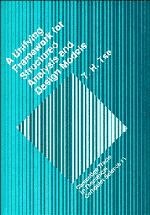 A Unifying Framework for Structured Analysis and Design Models
A Unifying Framework for Structured Analysis and Design Models Book contents
- Frontmatter
- Contents
- Preface
- List of Tables and Figures
- Chapter 1 Introduction
- Chapter 2 Desirable Features of Systems Development Environments
- Chapter 3 A Comparison with Related Work
- Chapter 4 An Initial Algebra Framework for Unifying the Structured Models
- Chapter 5 A Functorial Framework for Unifying the Structured Models
- Chapter 6 The Identification of Unstructuredness
- Chapter 7 A Prototype System to Implement the Unifying Framework
- Chapter 8 Conclusion
- Bibliography
- Index
Chapter 8 - Conclusion
Published online by Cambridge University Press: 28 January 2010
- Frontmatter
- Contents
- Preface
- List of Tables and Figures
- Chapter 1 Introduction
- Chapter 2 Desirable Features of Systems Development Environments
- Chapter 3 A Comparison with Related Work
- Chapter 4 An Initial Algebra Framework for Unifying the Structured Models
- Chapter 5 A Functorial Framework for Unifying the Structured Models
- Chapter 6 The Identification of Unstructuredness
- Chapter 7 A Prototype System to Implement the Unifying Framework
- Chapter 8 Conclusion
- Bibliography
- Index
Summary
Structured systems development methodologies have been recognized as the most popular tools in information systems development. They are widely accepted by practising systems developers because of the top down nature of the methodologies and the graphical nature of the tools. Unfortunately, however, the models are only derived from the experience of the authors. In spite of the popularity of these models, relative little work has been done in providing a theoretical framework to them. In this project, we have tried to solve the problem by defining a unifying theoretical framework behind the popular structured models.
We have defined an initial algebra of structured systems, which can be mapped by unique homomorphisms to a DeMarco algebra of data flow diagrams, a Yourdon algebra of structure charts and a Jackson algebra of structure texts (with equations). As a result, specifications can be transformed from one form to another. Algebraic interpreters may be adapted to validate the specifications.
We have also found that the proposed term algebra as well as the DeMarco, Yourdon and Jackson notations fit nicely into a functorial framework. The framework provides a theoretical basis for manipulating incomplete or unstructured specifications through the concepts of structured tasks and refinement morphisms. Moreover, DeMarco data flow diagrams can be mapped to term algebras through free functors. Conversely, specifications in term algebras can be mapped to other notations such as Yourdon structure charts by means of functors.
- Type
- Chapter
- Information
- A Unifying Framework for Structured Analysis and Design ModelsAn Approach Using Initial Algebra Semantics and Category Theory, pp. 166 - 167Publisher: Cambridge University PressPrint publication year: 1991


